Backlinks are an integral part of your SEO content marketing strategy. Search engines think of backlinks as votes for your content. While there are some backlinks that aren’t great for your site (which we’ll get into), the more backlinks you have in general, the higher your search engine ranking will be.
What Backlinks Are (and Aren’t)
A backlink is created when one website links to another website. In other words, Website #1 has an external link to Website #2. That’s it. Now, Website #2 has a backlink from Website #1. In the example below, the red text that reads “clickable from mobile devices” is a backlink to this blog post of ours.
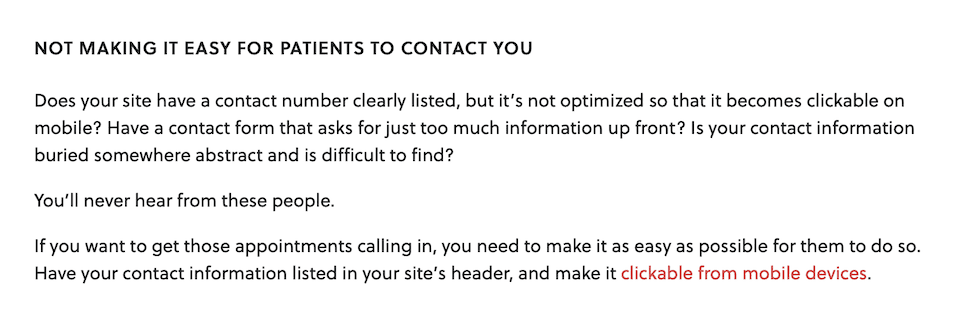
Source: Disruptive Advertising
Backlinks are also called “inbound links” and “incoming links,” but either way, they differ greatly from internal links. An internal link goes from one page of your own website to another page on your website. Check out our article about how internal links help SEO. You might hear internal links being referred to as backlinks, but that is not quite accurate.
The Purpose of Backlinks
Backlinks for SEO have been an integral part of website ranking since Google’s very first algorithm. If that doesn’t give you insight into just how important backlinks are, nothing will. Even though the algorithm has changed a lot through the years, backlinks are still a major ranking signal.
Why? They show that one website supports another. That Website #1 is vouching for Website #2. It’s like getting a thumb’s up from the first website. And search engines like when they can see that other sites stand behind your content. It makes their job easier.
When several sites have external links to your site, search engines determine that your content is worth those backlinks, which can raise your rank in search engine results. According to a 2020 study by Backlinko, the top search result in Google has an average of 3.8x more backlinks than the other top 10 positions.
The authority of the site that’s linking to you matters, too. Let’s say your homepage gets a backlink from a high-quality, popular site, like a major news outlet. Your homepage will get an authority boost from that backlink, as will the other pages on your site that are linked to from your homepage.
Backlinks do more than make Google happy — they’re also great for the user experience because they:
- Give the reader additional context and the ability to learn more about a topic
- Back up a claim made in the content
- Provide a source for a quote or a stat
- Recommend something, like a product or service you’re reviewing
But despite all of these perks, Backlinko found that 95% of pages don’t have backlinks. Ninety-five! That means there’s a lot of room for you to get an edge on the competition with a backlinks SEO strategy.
The Basics of Running a Backlinks SEO Campaign
Link building happens when one of two things happens:
- Someone finds your content online and decides to link to it.
- You present your content to someone in the hopes that they’ll link to it.
You don’t want to just start cold emailing anyone and everyone to ask for a backlink, though. Instead, there are far more savvy (and far less spammy) strategies. First, you have to know which type of backlinks you’re after, because some aren’t worth your time.
What You Should Know About SEO Backlinks Before You Get Started
From the number of sites linking to your content and the quality level of those sites to where the backlinks are located, every detail matters.
Assortment of Sites Providing Backlinks
The number of domains that link to a site correlates with that site’s rank. Getting backlinks from an assortment of sites is better than getting several from one site.
Quality of Sites Providing Backlinks
If a high-authority, popular, trustworthy, and well-performing site gives you backlinks, those are considered high-value. If a low-quality site gives you backlinks, though, those are low-value. Depending on how many of each you have, search engines will rank your content accordingly.
The more domain authority a website has, the more authority it can signal that your site has via that backlink. Ahrefs has a Website “Authority” Checker that’s free to use so you can see how highly regarded a site is.
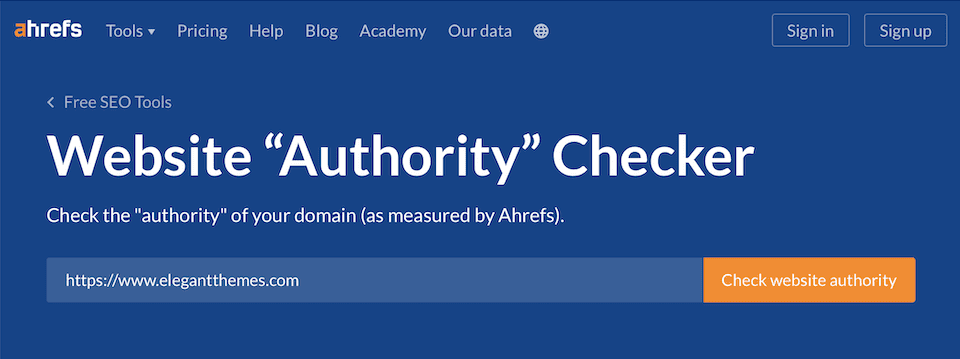
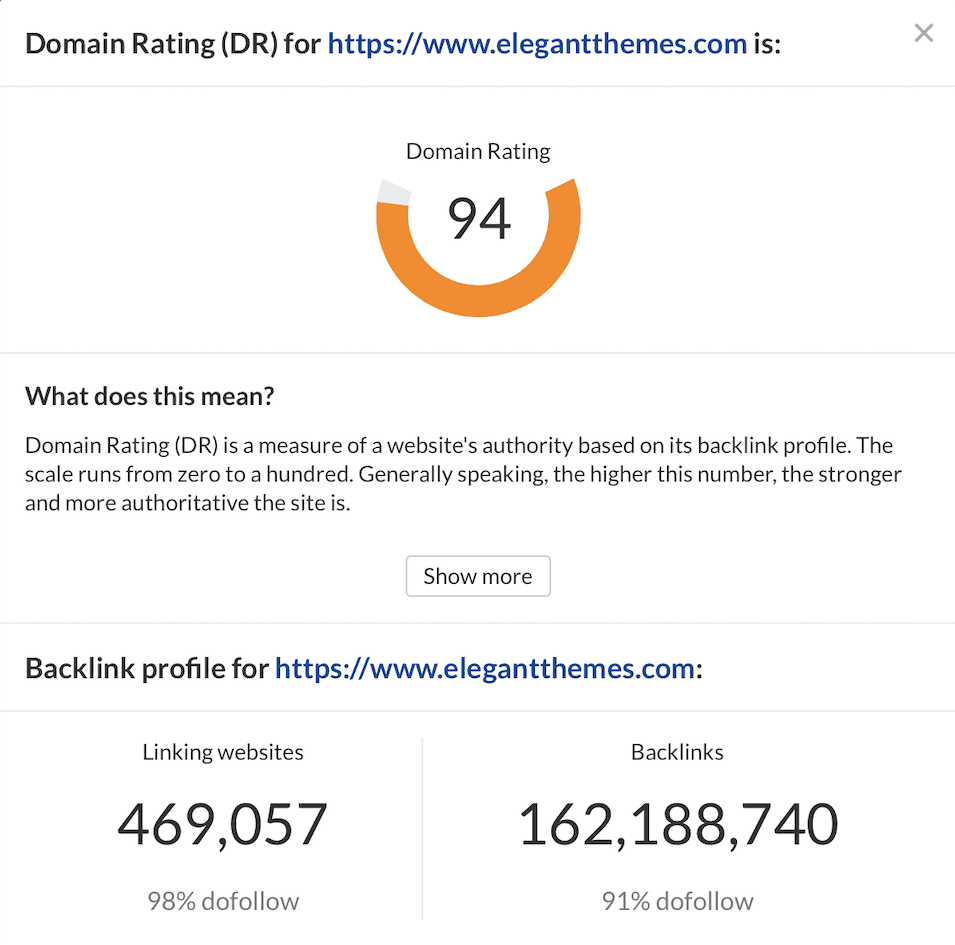
Location of Backlinks
The location of the backlink impacts its value. A backlink in a footer won’t be as valuable as a backlink in a blog post, for example. Also, a backlink that’s one of hundreds on a page is going to have less value than if it were the only one or one of just a handful.
Relevance of the Linked Content
The website and web page that has a backlink should be related to your website and content. For example, if you have a blog post with a review of a personal training app, your backlinks should come from sites and pages related to fitness or health rather than home decor or car maintenance. (If this isn’t the case, and you’re afraid of being penalized, you can always disavow backlinks from any website you don’t want Google to associate with you.)
Target Keyword in Anchor Text
A quality backlink should have your target keyword in the anchor text, which is the text that contains the link. In other words, it’s the text in a hyperlink that you can click. Here’s a good example of the target keyword in anchor text:

However, exact-match anchor text is an SEO no-no, as Google could punish your site for it. (Confusing, right?) An example of exact-match anchor text is if the anchor text is “internal links” on a website about…internal links. This doesn’t look very natural and it’s not helpful for readers, which can cause the link to be de-valued. To search engines, this is a clear sign that you’re trying to link-build. While a backlinks SEO strategy is good for your site, it shouldn’t be that obvious because it can look to search engines like you’re trying to manipulate results.
Basically, use a semantic anchor text strategy. Make it so that the anchor text is a full phrase that describes the target’s content, not just a broad overview.
Strategies for Getting Backlinks for SEO
Now that you know the backlinks to strive for and the ones to avoid, let’s get into strategies you can use when setting up a backlink campaign to improve your site’s SEO.
Competitive Backlink Research
This is when you look at the backlink profile of a competitor to find out where their backlinks are coming from. This works best if you look at their pages that target the same keywords as you target. When you do this, you can figure out the backlinks that have helped them, and you can then connect with those sites for your own link building.
For example, let’s say we have the target keyword “best hiking trails in North America” in a blog post. You can plug that search into Google and click on the top result. Take that URL and run it through Moz’s Link Explorer, then check out the inbound links. You can see the sites that are linking back to that article, and you can then decide if you want to contact those outlets to ask for a backlink (or to start building a relationship with them).

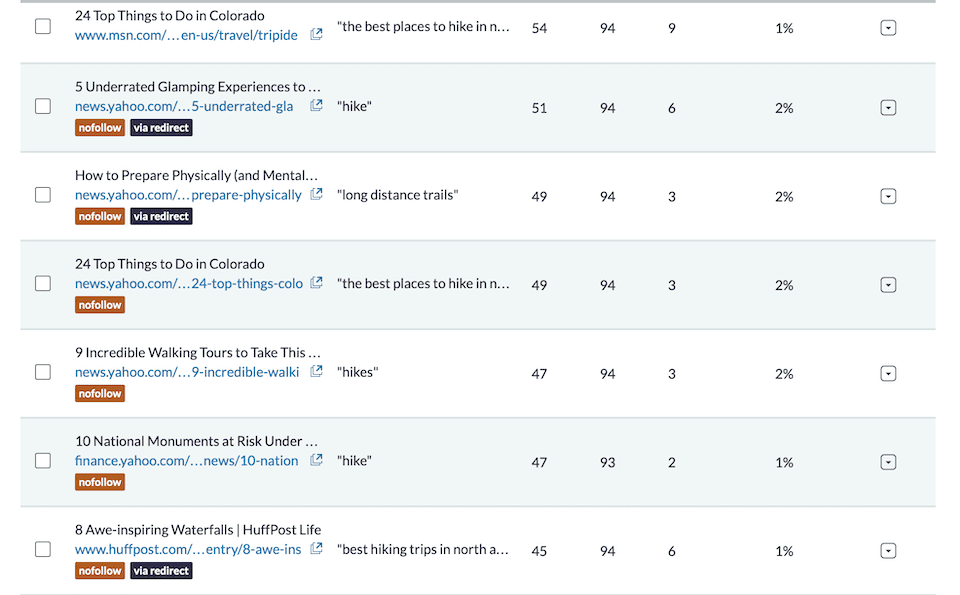
Guest Posting
Writing guests posts for quality sites in your niche is an excellent way to connect with a new audience and gain backlinks for your site. It can be hard to find the best places to write guest posts, though. If you know of an author in your niche, you can Google their name or “[Name] guest post” to see the outlets they’ve written for. If the domain has a decent authority rating and it matches your niche, you can consider pitching the editor or site owner a guest post.
Most authoritative sites get dozens, if not hundreds, of cold-emails a week about guest posting, so if they don’t respond (or don’t respond quickly) don’t take it personally.
Link Reclamation
This is when you find mentions of your company that aren’t yet linking back to your website. When you find them, reach out to the website owner and ask for a link. Tools like BuzzSumo and Mention can help you find mentions of your website online, and/or you can sign up for Google Alerts to get an email whenever your brand is mentioned.
Here’s an example from BuzzSumo. We searched for “Elegant Themes,” and we could check into the first result to see if they added a backlink to our site.

Link Roundups
Link roundups are pieces of content that creators produce to link out to other quality content. Look for roundups in your niche by searching for “[keyword] + link roundup” on Google. When you find a resource you like, pitch them for consideration.
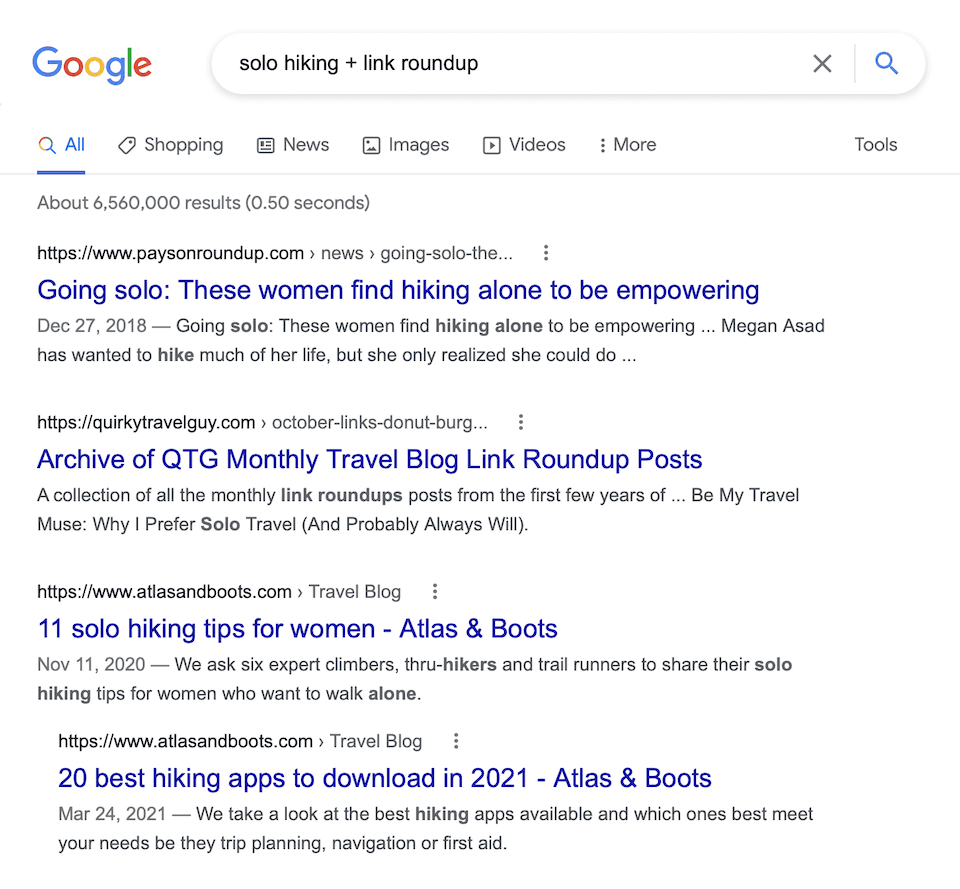
When looking at roundups, take into consideration that not every site will run to update their content just to add their link. Many sites keep a list of tools they get pitched and then check those out when they update the post to keep the content fresh. This might happen annually (best of 20xx lists, for instance), so your link might be in the next round, if not the current one.
Outreach About Outdated or Error Pages
The strategy here is to find web pages in your niche that are outdated or have a 404 error. Then, contact the website linking to that source to let them know one of their backlinks is pointing to out-of-date or broken content. And then pitch your content as a replacement.
For outdated content, once you come across an article that is no longer relevant, you can run the URL through a backlink checker to see which sites are pointing to it. For 404 error pages, the best option is to quick-check resource pages using the Check My Links extension for Chrome.
First, find a resource page by Googling “[keyword] + resources.” In the example below, we used “home decor + resources.” Using Chrome, open the page you’re interested in, then run the Check My Links extension. You’ll see the broken links in red.
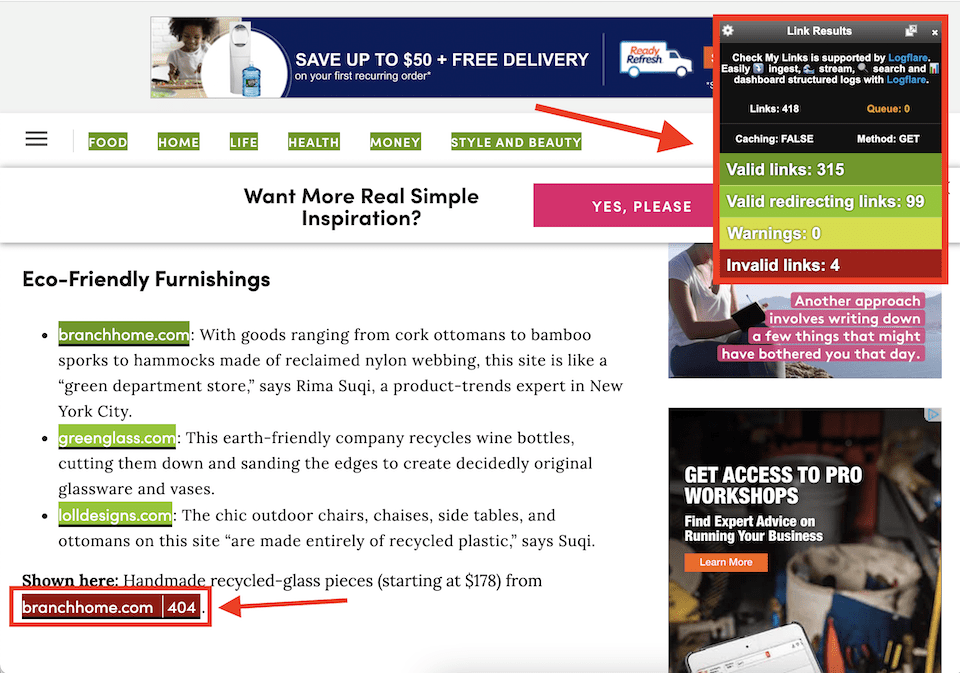
Much like the roundups strategy, reach out to the site, let them know their link is broken, and offer your site as a replacement if they think it fits. Don’t be pushy, but let them know your content is relevant.
Relationship Building
There are all sorts of ways to go about relationship building, but here are three that have the highest chance to lead to backlinks:
- If you have an existing professional relationship with another company, retailer or supplier, ask that they include a backlink to your site on their website, like in their listings section.
- Provide a partner with featured content they can add to their site. Or, better yet, co-promote both of your businesses. Not only will you trade backlinks, but you’ll both reach a larger audience.
- If you like a product or service, write a testimonial or pitch a case study or success story that the brand can publish.
Reviews
If you have a digital or physical product to promote, asking industry bloggers or vloggers to review it can often result in backlinks. Just make sure that you don’t offer the product (which you should provide to them at no cost) in exchange for a backlink. The hope is that they’ll cover your product and include a backlink, but you can’t outright ask for that.
Best Practices for a Backlinks SEO Strategy
You’re just about ready to head off on your own, but first, we want to quickly cover three must-know best practices:
Long-Form Content is Best
Longer content (around 1,500 to 2,000 words or even more), as opposed to short-form articles or blog posts, usually gathers more backlinks. Long-form content is considered a more linkable asset. This can be a how-to article or complete guide, but it can also be a survey, quiz, case study, or infographic. To make them easier to create and add to your long-form content, consider these survey plugins and quiz plugins.
Dofollow Links Are the Ones That Matter
Search engines won’t pay attention to nofollow links. The “nofollow” tag tells the search engine to ignore the link, so this type won’t be helpful for your SEO. Pay attention to that when analyzing your backlinks.
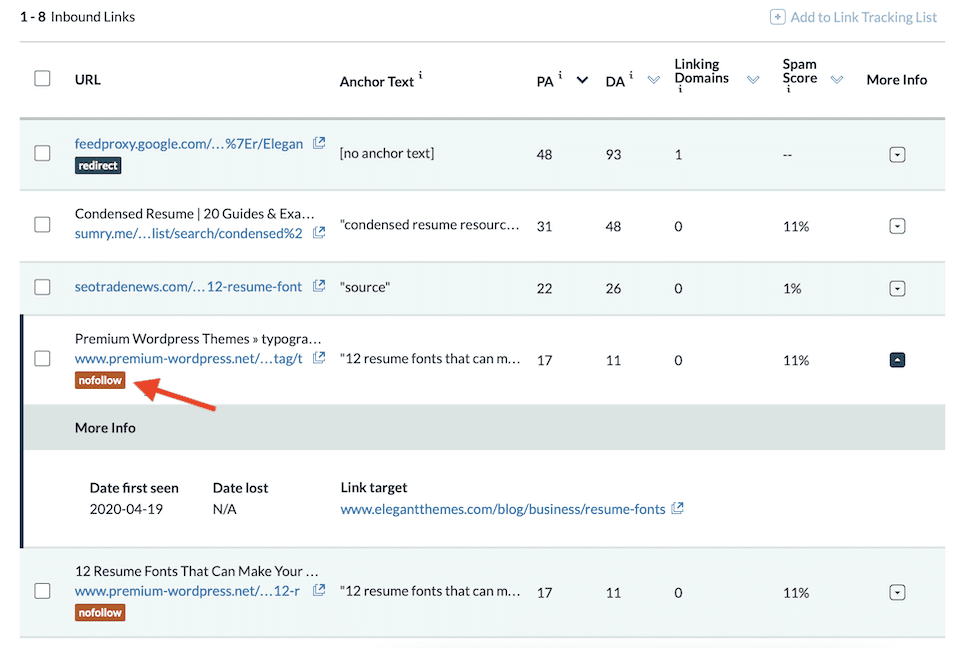
Source: Moz
Don’t Neglect Your Other Platforms
Add links to your pages from your other platforms, like your social media profiles. Be careful with this, though. You don’t want to go overboard, or else it could be considered a black hat SEO tactic. It gets into the potentially bad territory when dozens of social platforms get little use but all link to a specific post or article, rather than a homepage.
Wrapping Up
Despite what some would have you think, backlinks for SEO are certainly not dead. Google has changed its ranking algorithm time and time again, but something that’s held firm is the importance of backlinks. By creating quality content and focusing on backlinks from reputable sources, you can influence your site’s organic page ranking while pleasing your visitors.
Remember, though: A backlink strategy isn’t going to return stellar results overnight. It’ll take time to reap the benefits, but they’ll definitely be worth it. And in the meantime, you can conduct an SEO audit of your website to raise its potential even more.
What do you think the best tactic is to get new backlinks for your site? Let’s talk in the comments!
Article featured image by Visual Generation / shutterstock.com









A really good overview of SEO and Backlink building in general. I had never really come across the Elegant Themes blog and I’m finding myself reading through loads of them on my Sunday morning haha! Nice article!
Thank you for the interessing article! Especially the information, that “Long-Form Content is Best” was new for me. I think I will have to to some work… 😉
Great article. Keep writing. If I buy expired domains, will the backlinks be there?
Understood, try to give more such information
I really appreciate your effort.. because I have been following your article for quite long time and it is very help …
I have a question: I feel nowadays email outreach are more important in term of getting backlinks but every person is asking for huge amount in exchange for backlinks
So what is your thoughts on this ?
Good summary of a backlink introduction.
I wouldn’t give too much attention to the DA though. On the hand it’s easy to manipulate. See Fiverr who sell 80+DA links for a couple of bucks, that are worthless. On the other hand the site may not be relevant to your content, so the DA is worthless as well.
I think relevance and especially traffic are the most interesting factors for quality backlinks. Location and anchor are important as well.
What I am missing here is the “link-mix”. Another important factor. Only getting links from other blogs doesn’t look good in total. Always reach out for links in forums, Q & A sites, comment links, listings, PR-outreach etc. Also a mix from content/image links and do/no-follow links is good. The more “natural” the link-profile is the better.
what would be the best way to generate backlinks for a website? and effective too?
I like your blog and writing skill thanks for sharing this information.
Wonderful post with very useful tips! I’ve noticed that I still have too much to learn about linkbuilding. I’ll put it into practise some of the tips you’ve mentioned! Another thing that I’d like to point out is that it seems that the Chrome extension “Check my Links” is not longer in the Chrome Store, or at least I’ve not been able to find it. In replacement, I’ve found the “Broken Link Checker” extension, which I don’t know if it will do the same as the other one.
Very good overview of SEO and backlink optimization. I would like to add, that referring sites can have a bad spam score, which drops the value of a backlink.
And what I’d like to know is: should backlinks mainly refer to the main page or to specific blogposts or categories?
In general, a mix of both. If you’re working on pillar content, it’s a good idea to have links to that particular article. And since Google looks at link relevancy, you will want different websites linking to specific articles to show context. But you also want those links that head to your homepage because it signals that your whole website is worth looking at.
Thank you very much for this post.
What do you think about expired domains?
expired domains are good if they are old and have good domain authority.